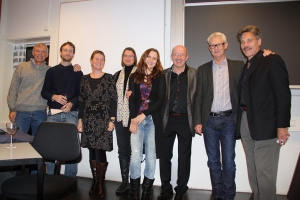By Robert Shuter
 Aarhus is the second largest city in Denmark—a beautiful community on Jutland Island, about a half hour by plane from Copenhagen. Sponsored by two business schools in Aarhus, I was distinguished guest lecturer for a week and spoke at Aarhus Business Institute and Aarhus University Department of Business. Both schools are keenly interested in culture and communication—as are many European business programs—and the Danes and Swedes have been big fans of intercultural communication. Why? Since both are small countries —about five million in Denmark and 9 million in Sweden—they have to export their products globally, and that means understanding their neighbors in Europe, Asia, and even the U.S. As a result, they take culture and communication very seriously and realize that without effective intercultural relations, the European Union—consisting of 27 Western and Eastern European nations—won’t reach it’s goal of becoming one, unified Europe. So why invite me to Denmark to lecture for a week?
Aarhus is the second largest city in Denmark—a beautiful community on Jutland Island, about a half hour by plane from Copenhagen. Sponsored by two business schools in Aarhus, I was distinguished guest lecturer for a week and spoke at Aarhus Business Institute and Aarhus University Department of Business. Both schools are keenly interested in culture and communication—as are many European business programs—and the Danes and Swedes have been big fans of intercultural communication. Why? Since both are small countries —about five million in Denmark and 9 million in Sweden—they have to export their products globally, and that means understanding their neighbors in Europe, Asia, and even the U.S. As a result, they take culture and communication very seriously and realize that without effective intercultural relations, the European Union—consisting of 27 Western and Eastern European nations—won’t reach it’s goal of becoming one, unified Europe. So why invite me to Denmark to lecture for a week?
Over the years I’ve been fascinated with Scandinavia— it’s not their cars, food, or landscapes that first seduced me—it’s their unique cultural values and behaviors that I have found so interesting. In short—it’s the “Law of Jante” that got me hooked on Denmark and Sweden! No, it’s not a municipal statute or a national mascot—the “law of Jante” is an indigenous cultural value that roughly means—don’t think you’re better than anyone; don’t think you’re more important than the group. Modesty, humility, even shyness are valued traits in Scandinavia—and so is conforming to the group. Swedes, for example, have been referred to as the Japanese of Europe, and it’s probably the Law of Jante that earned them that reputation.
This trip I lectured on Global Business in a New Media Age—a new topic for them and a relatively new interest of mine. With myriad new media platforms available worldwide, how do businesses, both large and small, understand the unique cultural dimensions of new media use to reach global customers? Do Chinese, for example, have unique digital preferences when courting customers? How about Scandinavians? In short, how does “culture” drive our digital habits and behaviors? The lectures seemed to resonate with students, faculty and Danish business executives which may be reflected in the picture below taken after a lecture of mine at the Aarhus Business Institute.
And the food was great—no margarine, no sugar substitutes, no frozen vegetables: only the real McCoy—butter, whole milk, creamy chocolate, red meat, and fresh everything. So good and so dangerous!
It was a great week.
Robert Shuter is a Professor of Communication Studies in the Diederich College of Communication.




0 Responses to “A Week at Aarhus University/Aarhus Business Institute, Denmark”